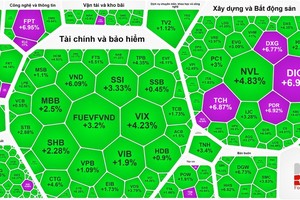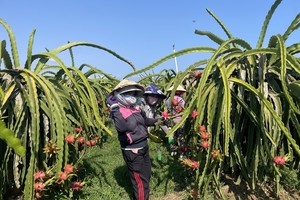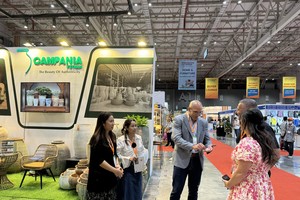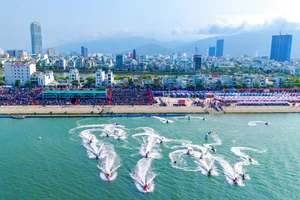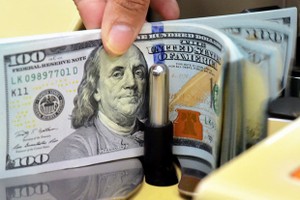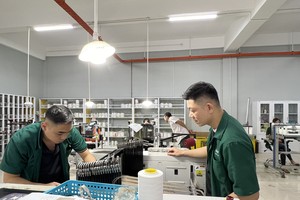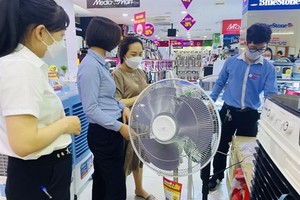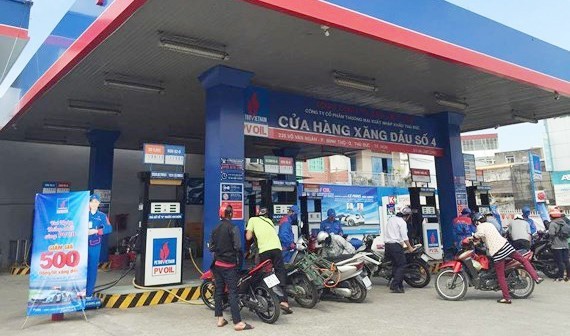
Particularly, the city currently has 545 fuel stations, 15 fuel wholesalers, 43 fuel distributors, one trader as general agent, and 16 retail agents. These units are still operating normally with monthly consumption of 200,000 cubic meters or 6,500 cubic meters per day. Besides, the total production of Dung Quoc and Nghi Son oil refineries in the second quarter of this year is expected to reach 3,033,807 tons, around 200,000 tons higher than that in the first quarter of this year. This is also the basis to affirm that the source of fuel is not scarce.
Meanwhile, regarding the closure of many fuel enterprises in Dak Lak Province in the past day, Mr. Mai Manh Toan, Director of the provincial Market Surveillance Agency, said that because they ran out of fuel supply. According to Mr. Le Van Quy, the owner of Quy Dieu Private Company in Krong Nang District in Dak Lak Province, his company has three fuel stations in Ea Toh, Dlie Ya communes, and Krong Nang Town and two of them had to temporarily close.
‘Currently, the State sets the selling price of A95 gasoline at VND12,470 per liter, and that of oil at VND10,040 per liter. Meanwhile, the fuel distributor announces that the price of delivered A95 gasoline is VND12,570 per liter, and that of oil is VND10,090 per liter. Although buying price is higher than selling price, the company has to make up for losses, in the past days, the company has contacted its distributor to request fuel supply many times, the distributor always said that they were out of stock,’ said Mr. Quy.
Mr. Tran Trong Luu, Head of the Commercial Management Department under the Department of Industry and Trade of Dak Lak Province, said that due to the developments of the Covid-19 pandemic, in the past time, the fuel supply from oil-producing countries was limited and scarce. In addition, the current buying price of gasoline is higher than the selling one, so some private retail enterprises temporarily stop selling for fear of suffering losses. Currently, the department has received many petitions from fuel retailers in the area and is making a report to the Ministry of Industry and Trade on the above situation.
According to the current regulations, fuel is a conditional trading item, so if the fuel station wants to close, it must ask for permission 30 days in advance and must be approved by the authorities. If it does not comply with the regulations, it will be fined and revoked license for three months.
Regarding this matter, Mr. Tran Duy Dong, Head of the Domestic Market Department under the Ministry of Industry and Trade, has just signed four express documents to send to relevant departments to ask them to ensure fuel supply in the market, inspect, and control fuel trading activities.
Accordingly, the Domestic Market Department requested the provincial and municipal departments of industry and trade to closely monitor the sale of fuel at fuel retail stations in the area, ensuring the supply of petrol and oil for production and consumption of people and businesses; request the General Department of Market Surveillance to direct units to coordinate with the provincial department of industry and trade in strengthening inspection and control, ensuring that fuel traders in the area strictly comply with the provisions of the Decree No.83/2014/ND-CP of the Government on fuel trading, and strictly handling violators.
The Department of Domestic Market ordered oil refineries to increase capacity, complete maintenance quickly to provide enough fuel supply under the contracts signed with enterprises; have a plan on the sources of fuel to ensure supply for the domestic market in the near future; propose petrol wholesalers to actively seek the sources of fuel, adequately provide the domestic market with the types of petrol and oil that they are producing and trading, in order not to interrupt the supply in the trading network of enterprises; make plans on the sources of fuel to ensure supply for the market in the near future.
Meanwhile, regarding the closure of many fuel enterprises in Dak Lak Province in the past day, Mr. Mai Manh Toan, Director of the provincial Market Surveillance Agency, said that because they ran out of fuel supply. According to Mr. Le Van Quy, the owner of Quy Dieu Private Company in Krong Nang District in Dak Lak Province, his company has three fuel stations in Ea Toh, Dlie Ya communes, and Krong Nang Town and two of them had to temporarily close.
‘Currently, the State sets the selling price of A95 gasoline at VND12,470 per liter, and that of oil at VND10,040 per liter. Meanwhile, the fuel distributor announces that the price of delivered A95 gasoline is VND12,570 per liter, and that of oil is VND10,090 per liter. Although buying price is higher than selling price, the company has to make up for losses, in the past days, the company has contacted its distributor to request fuel supply many times, the distributor always said that they were out of stock,’ said Mr. Quy.
Mr. Tran Trong Luu, Head of the Commercial Management Department under the Department of Industry and Trade of Dak Lak Province, said that due to the developments of the Covid-19 pandemic, in the past time, the fuel supply from oil-producing countries was limited and scarce. In addition, the current buying price of gasoline is higher than the selling one, so some private retail enterprises temporarily stop selling for fear of suffering losses. Currently, the department has received many petitions from fuel retailers in the area and is making a report to the Ministry of Industry and Trade on the above situation.
According to the current regulations, fuel is a conditional trading item, so if the fuel station wants to close, it must ask for permission 30 days in advance and must be approved by the authorities. If it does not comply with the regulations, it will be fined and revoked license for three months.
Regarding this matter, Mr. Tran Duy Dong, Head of the Domestic Market Department under the Ministry of Industry and Trade, has just signed four express documents to send to relevant departments to ask them to ensure fuel supply in the market, inspect, and control fuel trading activities.
Accordingly, the Domestic Market Department requested the provincial and municipal departments of industry and trade to closely monitor the sale of fuel at fuel retail stations in the area, ensuring the supply of petrol and oil for production and consumption of people and businesses; request the General Department of Market Surveillance to direct units to coordinate with the provincial department of industry and trade in strengthening inspection and control, ensuring that fuel traders in the area strictly comply with the provisions of the Decree No.83/2014/ND-CP of the Government on fuel trading, and strictly handling violators.
The Department of Domestic Market ordered oil refineries to increase capacity, complete maintenance quickly to provide enough fuel supply under the contracts signed with enterprises; have a plan on the sources of fuel to ensure supply for the domestic market in the near future; propose petrol wholesalers to actively seek the sources of fuel, adequately provide the domestic market with the types of petrol and oil that they are producing and trading, in order not to interrupt the supply in the trading network of enterprises; make plans on the sources of fuel to ensure supply for the market in the near future.

